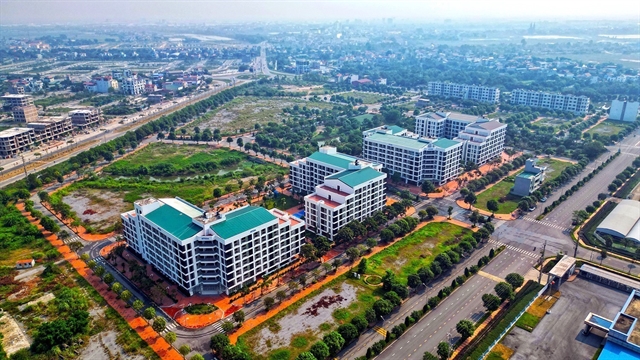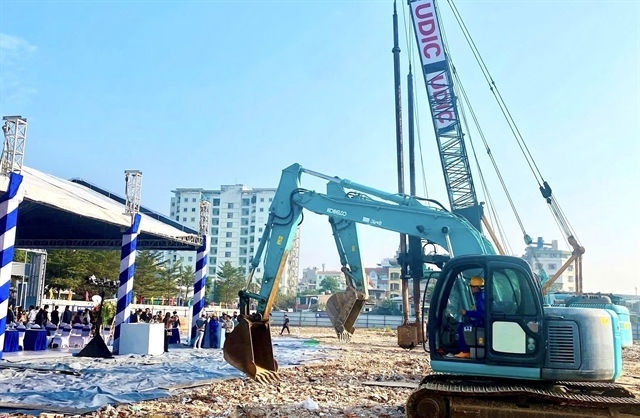Experts emphasised the need to channel funds into less risky segments like social and affordable commercial housing to ensure a balanced real estate market. They also urged swift implementation of new regulations under the Housing Law and Land Law to shorten the project timelines.

HÀ NỘI – A severe shortfall in the construction of social housing has underscored the urgent need for robust policies to stimulate business involvement and expedite land allocation for housing projects.
Thus far, only about 21,000 social housing units have been completed nationwide, a figure that falls significantly short of the Government's target of 130,000 units.
Achieving this goal is crucial to advancing the government’s ambitious plan to build one million social housing units for low-income individuals and industrial park workers by 2030.
In Bắc Ninh Province, a hub with a significant industrial workforce, efforts have been made to optimise conditions for developing worker housing.
The province aims to construct more than 30,000 units by 2025 and more than 41,000 units from 2026 to 2030.
These goals are seen as attainable due to proactive measures.
"In addition to central government policies on loans and interest rate support, the province will allocate local funding to support social housing development. The Department of Construction will also collaborate with investors to review and promptly address difficulties in project investment, from planning, appraisal and approval to compensation and land clearance," Nguyễn Tuấn Dũng, Deputy Director of the Bắc Ninh Department of Construction, told the Voice of Vietnam.
In HCM City, the housing development programme for 2021–2030 and the central government’s social housing goal have prompted authorities to set a target of building 69,700 to 93,000 units in the city by 2030.
However, achievements so far have been modest.
The HCM City Department of Construction has proposed solutions related to planning, investment approval, land management, repurposing public assets, financial resources and enhanced responsibilities of relevant agencies and district governments.
The department has also reviewed feasible projects to expedite construction for the 27 approved social housing initiatives and recommended prioritising public investment in four projects that comprise approximately 4,000 units.
As for the business perspective, Trương Anh Tuấn, Chairman of the Board at Hoàng Quân Real Estate Corporation, said: "New regulations clearly impact businesses, providing them with a roadmap for planning and land allocation by localities. For businesses, with a 10 per cent profit margin, ensuring clear and accurate accounting is crucial to maintain that margin."
"Previously, final profits were significantly reduced. If done well, the 20 per cent allocation for commercial or service housing within projects can also generate additional profits for developers."
Challenges and legislative improvements
The Ministry of Construction reported that around 21,000 social housing units were built in 2024. While this fell short of the target, positive progress was evident.
Three new laws affecting the real estate market, including the 2023 Housing Law, have introduced significant changes to facilitate social housing development.
However, these policies require time to take effect.
"For businesses, profit is crucial. Participation in this sector must yield profits, albeit slightly lower than for commercial housing but still competitive with market averages. Land designated for social housing must be accessible and cost-effective," said Trần Văn Lâm, a standing member of the National Assembly’s Finance and Budget Committee.

Experts emphasised the need to channel funds into less risky segments such as social and affordable commercial housing to ensure a balanced real estate market. They also urged swift implementation of new regulations under the Housing Law and Land Law to shorten the project timelines.
Furthermore, mechanisms for developing housing for low-income individuals and industrial workers must be more flexible than current ones.
National Assembly delegate Đinh Ngọc Minh from Cà Mau Province argued: "The Housing Law should allow individuals with land to build and sell housing themselves. The government must establish standards for housing for low-income groups while reducing administrative procedures."
"Some processes should be eliminated to speed up policy implementation by 2030. If housing is within planned areas, individuals should be able to build. This would increase supply and make housing more accessible for low-income buyers. If we stick to current sequential methods, the process will be slow and costly."
The Ministry of Construction has urged localities to push developers of commercial and urban housing projects to fulfil their obligation to build social housing on 20 per cent of allocated land. If developers fail to act, the 20 per cent land should be reclaimed and reassigned to other qualified developers.
For land without approved investment policies, authorities must promptly draft plans, review feasibility studies and incorporate projects into local programmes to streamline approvals.
"For land with established usage rights, investment policies and developer selection can proceed simultaneously. In cases requiring bidding with only one participant, approval can be granted. For two or more participants, bidding laws will apply to ensure transparency and select the most capable developer. Such measures will expedite developer selection," said Hà Quang Hưng, Deputy Director of the Department of Housing and Real Estate Market Management under the Ministry of Construction.
The government’s plan to build at least one million social housing units by 2030 has set a clear target. Policies are being developed and refined. The key now lies in coordinated implementation by ministries, agencies and localities to enhance social housing development, enabling low-income individuals and workers to secure stable housing and contribute to a sustainable real estate market. VNS





